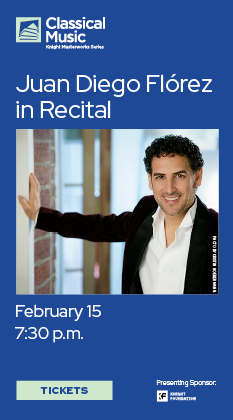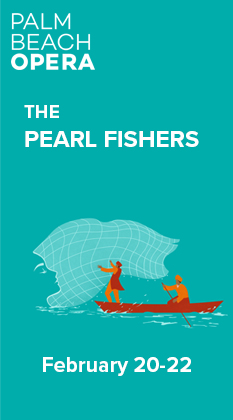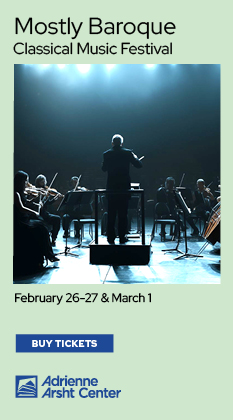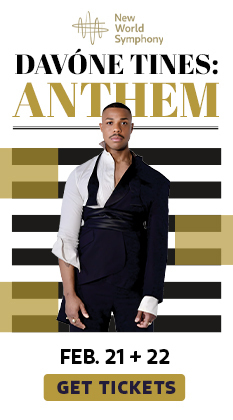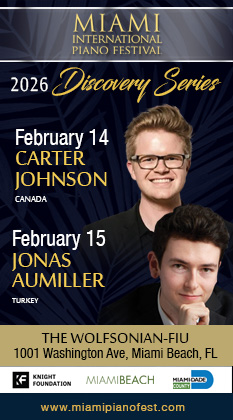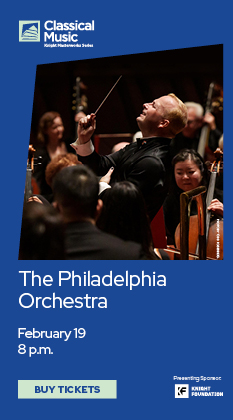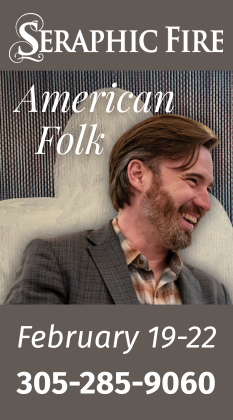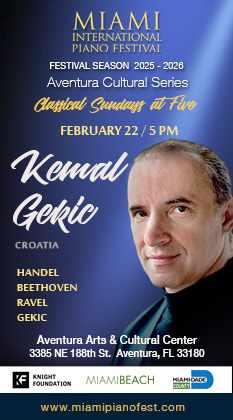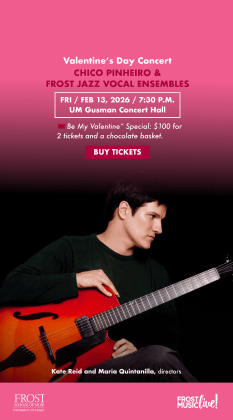A mixed bag of old and new music in New World’s closing chamber program
The New World Symphony’s final chamber music concert of the season ranged qualitatively from the sublime to the absurd Sunday afternoon at New World Center.
The orchestral academy’s fellows were joined by three members of the International Contemporary Ensemble (ICE). That New York-based new music collective has given over 1,000 premieres in its twenty year existence. It specializes in “high modernism” and the three new and recent works illustrated the uneven rewards of the extremes of contemporary musical creation.
Scores by Brahms and Shostakovich served as bookends to the program. Four Chorale Preludes by Brahms, originally conceived for organ, opened the concert in arrangements for brass septet by Simon Cox. These are among Brahms’ final compositions and are clearly a tribute to Johann Sebastian Bach. Setting some of the same Lutheran chorales that Bach utilized, Brahms’ Baroque and classical roots come to the fore.
Cox’s transcriptions add the gleam of brass sonorities to the original conception. Three trumpet players (Alan Tolbert, Morgen Low and Kenneth Chauby) captured the spirit of “O God, Thou Faithful God.” The rounded tones of lower brass (trombones and tuba) encapsulated the solemn aura of “O World, I Must Leave Thee” and “My Heart Abounds With Pleasure” resounded as a ceremonial anthem.
Shostakovich’s Piano Quintet in G minor, the program’s closing piece, dates from 1940 before the horrors of World War II would come to Russian soil and engulf the composer in the siege of Leningrad. For Shostakovich, this work is unusually light and melodious but, beneath the surface, some musical clouds lurk. (This score also marked Shostakovich’s final public appearance as a piano soloist in a 1964 performance with the Borodin Quartet.)
The five New World players were fully equal to the quintet’s formidable demands. Pianist Wesley Ducote’s dexterity was evident in the stern opening flourishes of the Prelude. Jacob Buhler’s solo violin introduced the principal subject of the Fugue: Adagio in measured lines. Along with violinist Allison Taylor, violist Toby Winarto and cellist Vivian Chang, Ducote and Buhler strongly articulated the severity of the contrapuntal writing. Here Shostakovich was also intrigued by Bach’s music (as evident in his 24 Preludes and Fugues for piano).
The Scherzo brings a dose of typical Shostakovich sarcasm. Ducote tackled the main theme with fleet bravura and the devilish secondary violin figure was given appropriate sinister zest by Buhler. A lyrical Intermezzo: Lento found the string ensemble strongly defined with unanimity of pacing and balance.
The rhythmic spirit of the Finale: Allegretto came through at full force. Ducote’s pounding momentum remained unabated right up to the witty quiet ending, which left the audience puzzled whether to applaud prior to the deserved standing ovation.
Flutist Isabel Lepanto Gleicher, clarinetist Joshua Rubin and bassoonist Rebekah Heller from ICE joined the players for two New World commissions and a score by the group’s new director George Lewis. (Heller is the ensemble’s former director and a New World alumna from 2005-2008.)
The least interesting and noteworthy of the new works was Unnoticed Spectacles II by Brazilian composer Fernanda Aoki Navarro. Last season, the New World played Navarro’s Pethengenesis, an entertaining musical vaudeville.
The new work, which was presented in a revised version especially conceived for the facilities of the New World Center, could hardly be called chamber music. “Performance art” would be a more proper classification. An amplified soprano sits on the stage floor repeating short phrases and wind sounds and percussive static emerge from speakers. Finally, the wind players squeak their way up the aisles and go to the hall’s high satellite stages. They join the onstage soprano in playing water glasses against huge projection of the water in the glass. The three ICE players finally come down to the front of the stage while the soprano ends with some indecipherable spoken lines. Call it “theater of the absurd” but the musical value of Navarro’s work was dubious. Kayleigh Butcher capably performed the thankless soprano role.
George Lewis’ Artificial Life 2007 is reminiscent of the anarchistic spirit of John Cage’s musical circuses. The wind, string, keyboard and percussion players do not play from annotated scores but from a set of instructions presented graphically on a grid. In the first part, individual players improvise while whole sections do improvisations in part two. Heller acted as a coordinator, cuing each improvised pattern. Butcher added yelps and vocalizations around the instruments’ paths.
At 15 minutes, this musical happening does not wear out its welcome, surprisingly. Individual moments by plucked strings and abrupt rhythmic percussion proved entrancing. Concluding with breathing through wind instruments, the work proved surprisingly diverting and could never be repeated again the same way.
Chains, Rope and Vertebrae by Sofia Rocha, which received its world premiere, was the most conventional of the new scores. The Florida-born composer refuses to explain or define the four section work’s provocative title. Rocha certainly displays a strong affinity for writing that exploits each instrument’s colors and technique.
The initial “Entr’acte” suggests a fanfare right out of Hollywood’s golden age. “Bind” brings whirling figures for flute, clarinet and bassoon which allowed Gleicher, Rubin and Heller to take center stage and display their impressive techniques. Trombone wails and an oblique suggestion of the blues embellish “Hold, shiver.”
Shimmering harp lines bring a sense of mystery against surprising turns of wind chording. Brassy climaxes and tinkling marimba add to the eerie stew. “Flex,” the final section, tends to wander aimlessly, the conclusion seemingly disjointed. Still, Rocha seems an interesting and inventive composer who suggests an ability to honor music’s past while exploring its future. This score makes one eager to hear more of her work.
Michael Linville conducted the 12-piece ensemble in a spirited and dynamic reading. Phoebe Powell’s elegant harp and, Noah Roper’s jazz-tinged trombone took special honors in solo moments. The composer was warmly applauded and joined in applauding the musicians.
Matthias Pintscher conducts the New World Symphony in Messiaen’s Des canyons aux étoiles 7:30 p.m. April 1 at the New World Center in Miami Beach. nws.edu
Posted in Performances
Leave a Comment
Mon Mar 27, 2023
at 12:34 pm
No Comments
